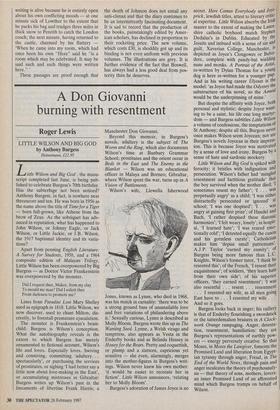A Don Giovanni burning with resentment
Roger Lewis
LITTLE WILSON AND BIG GOD by Anthony Burgess Heinemann, f12.95 Little Wilson and Big God , the manu- script completed last June, is being pub- lished to celebrate Burgess's 70th birthday. Has the subterfuge not been noticed? Anthony Burgess, in fact, is nowhere near threescore and ten. He was born in 1956 as the name above the title of Time for a Tiger — born full-grown, like Athene from the brow of Zeus. As the sobriquet has adv- anced in reputation, what has happened to John Wilson, or Johnny Eagle, or Jack Wilson, or Little Jackie, or J.B. Wilson, the 1917 baptismal identity and its varia- tions?
Apart from penning English Literature: A Survey for Students, 1958, and a 1964 composite edition of Malayan Trilogy, Little Wilson has been overpowered by Big Burgess — as Doctor Victor Frankenstein was overpowered by the monster.
Did I request thee, Maker, from my clay To mould me man? Did I solicit thee From darkness to promote me?
Lines from Paradise Lost Mary Shelley used as epigraph in 1818. Little Wilson, we now discover, used to chant Milton, dis- creetly, to forestall premature ejaculation.
The monster is Frankenstein's brain- child: Burgess is Wilson's conception. What the autobiography reveals is the extent to which Burgess has merely ornamented to fictional account, Wilson's life and loves. Especially loves. Swiving and conniving, committing `adultery.. spectacularly', or purchasing the services of prostitutes, or sighing 'I had better say a little now about love-making in the East', or accumulating mistresses in Gibraltar: Burgess writes up Wilson's past in the lineaments of libertine Frank Harris; a Manchester Don Giovanni.
Beyond this memoir, in Burgess's novels, adultery is the subject of The Worm and the Ring, which also documents Wilson's time at Banbury Grammar School; prostitutes and the orient occur in Beds in the East and The Enemy in the Blanket — Wilson was an educational officer in Malaya and Borneo; Gibraltar, where Wilson spent the war, turns up in A Vision of Battlements.
Wilson's wife, Llewella Isherwood Jones, known as Lynne, who died in 1968, was his match in carnality: 'there was to be a strong ground bass of unassailable love and free variations of philandering above it.' Sexually curious, Lynne is described as Molly Bloom. Burgess wrote this up as The Wanting Seed. Lynne, a Welsh virago and temptress, also appears as Vesta in the Enderby books and as Belinda Hussey in Honey for the Bears. Pretty and coquettish, or plump and a slattern, capricious yet sensitive — she even, alarmingly, merges into the mother-figures in Burgess's writ- ings. Wilson never knew his own mother: `it would be easier to recreate her in fiction'. Little Wilson announces, `relating her to Molly Bloom'.
Burgess's adoration of James Joyce is no secret. Here Comes Everybody and Joys- prick, lewdish titles, attest to literary critic' al expertise. Little Wilson absorbs the Irish master to the extent of making the Lanca- shire catholic boyhood match Stephen Dedalus's in Dublin. Educated by the, Jesuits and imbued with a sense of sin and guilt, Xaverian College, Manchester, Is depicted as Joyce's Clongowes or Belve- dere, complete with pandy-bat wielding nuns and monks. A Portrait of the Artist, re-written by Dylan Thomas for a young dog is here re-written for a younger puP. And in his writing career Ulysses is the model: 'as Joyce had made the Odyssey the, substructure of his novel, so the Aenclu would be the underpinning of mine.' But despite the affinity with Joyce, both personal and stylistic; despite Joyce want- ing to be a saint, his life one long martyr' dom — and Burgess subtitles Little Wilson a volume of confessions, the temptations of St Anthony; despite all this, Burgess never once makes Wilson seem Joycean; nor are Burgess's novels Joycean in their impress- ion. This is because Joyce was motivated by a sense of love and irony, Burgess by a sense of hate and sardonic mockery. Little Wilson and Big God is spiked with ferocity; it bristles with indignation and persecution. Wilson's father had 'mingled resentment and factitious gratitude' that the boy survived when the mother died; sometimes resent my father'; 'I . . . was perpetually angry' as a child; 'I was either distractedly persecuted or ignored' at school; 'I was one despised'; 'I . . . was angry at gaining first prize'; of Handel and Bach, 'I rather despised these diatonic harmonies'; 'I felt weary, lonely'; in hospit- al, 'I learned hate'; 'I was reared emo- tionally cold'; 'I detested equally the canon and his gormless curate'; Catholicism makes him `depise small patriotisms • A.J.P. Taylor 'earned my enmity'; of Burgess being more famous than L.C. Knights, Wilson's former tutor, 'I think he resented this'; of the French, 'I resent their exquisiteness'; of soldiers, 'they learn hate from their own side'; of his superior officers, 'they earned resentment'; 'I was also resentful . . . resent . . . resentment . . . I resented my wife, as all men going East have to . . . I resented my wife . . • And so it goes.
Burgess looks back in anger; his raillery is that of Enderby flourishing a swordstick or the tatterdemalion bruisers in A Clock- work Orange rampaging. Anger, detesta- tion, resentment, humiliation: they are Burgess's representations of earthly pow- ers — energy perversely creative. So that Moses, in Moses the Lawgiver, foments the Promised.Land and liberation from Egypt- ian tyranny through anger; Freud, in The End of the World News, through pain and anger inculcates the theory of psychoanaly- sis — that theory of sons, mothers, lovers: an inner Promised Land of an afforested mind which Burgess tramps on behalf of Wilson.


















































 Previous page
Previous page